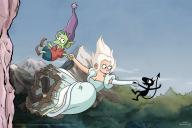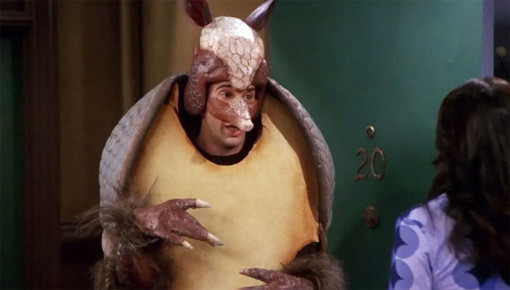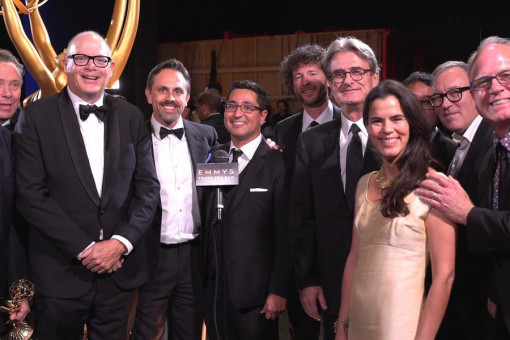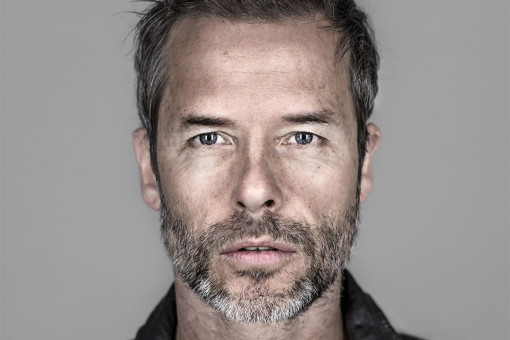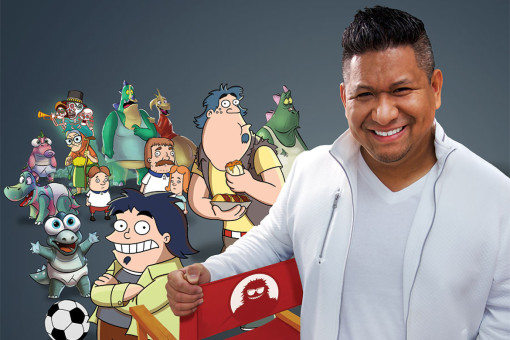Matt Groening turned a funhouse mirror on America with The Simpsons in 1989, and 10 years later, he put his comic spin on dystopia with Futurama.
Nearly two decades on, he's left Fox for Netflix, where he's made Disenchantment, a fractured Middle Ages fairy tale about a bucktoothed, hard-drinking princess whose best pals are a demon and an elf. It's ironic that around the same time last year that Disney was firming up its plans to swallow Fox, Groening began parodying the Magic Kingdom so mercilessly.
Futurama alum John DiMaggio, who voices King Zøg on the show, described Disenchantment this way at Comic-Con: "It's as if The Simpsons fornicated with Game of Thrones."
"Everything I do is an alternative to whatever the dominant culture is," Groening says. "The Simpsons is like taking a family sitcom and turning it on its head; it's basically about America and what it's like to be alive and struggling. Futurama is taking the solemnity of science fiction and making fun of it.
"Disenchantment takes another genre, fantasy, and makes it almost beside the point. I love fantasy as a genre, but no kidding, the genre takes a few seconds to get exhausted. So the fun part was creating characters with [executive producer] Josh Weinstein that could live in any universe — but just happen to have fantasy powers.
"And Abbi Jacobson from Broad City has brought so much soul to the character of [Princess] Bean because of her amazing voice and her sensibility."
She's joined by Eric Andre as Luci, the personal demon, and Nat Faxon as Elfo, the lovelorn elf.
"In addition to being amazing performers," Groening says, "what those three have in common is, they're also writers and live-action performers, so they can improvise. We try to write the funniest stuff we can, but then they kick it up a notch. When actors can find a joke that you didn't even know was there, and add their own take on it, it's a dream."
Groening arrived in Los Angeles from Oregon in 1977, looking for work as a writer. But he had another skill. "I remember drawing from the first day of the first grade, when I should have been paying attention," he recalls. "I developed my style of the big eyeballs and a big overbite about sixth grade, and I've never changed. I've never gotten better."
He first made his mark with Life in Hell, a comic strip "partly inspired by the fact that I was working in a photocopy place."
In 1980, the strip started running in the Los Angeles Reader, an alt-weekly where he worked in operations. Anarchic and strange, the cartoon won Groening a chance to create bumpers for The Tracey Ullman Show in 1989.
Rather than sell his Hell characters to Fox, he invented the Simpsons family, who soon graduated to their own show. It is now the longest-running American scripted primetime series, with 33 Emmys to its name.
Groening says his earliest inspiration was Joseph Heller's satirical novel Catch-22, a gift from his dad, Homer, a former bomber pilot.
"I was 12 or 13, and it was amazing because it basically posited authority as being corrupt and stupid and not having your best interests in mind at all. That shaped me to this day. I asked my dad after I read it, 'That's what it was like for you in World War II?' And he said, 'No, no, no. It's just a really good book.'"
Like that book and all of Groening's work, Disenchantment makes social critique fun. And working in genres helps.
"That's the thing with science fiction and fantasy," he says. "Do you posit a world that you would like to exist or that you think is more like real life? I lean toward the negative because I think it's funnier and more realistic. People being their own worst enemies — that's definitely at the core of Disenchantment."
While The Simpsons may outlast us all, Futurama ran just four seasons on Fox and another four on Comedy Central (2009–13). This year, like so many TV creators, Groening brought his distinct vision — and many longtime collaborators — to a streaming service.
The first 10 half-hour episodes of Disenchantment are available (the serialized story ends with a major cliffhanger), and the next 10 will arrive September 20. Netflix has committed to an additional 20 episodes that will roll out in 2020 and 2021. All that suits Groening just fine.
"I have the best job in the world," he says. "I get to come up with whims, and then other people have to come up with the hard part. I can design characters, but I would never be able to get a job at [his longtime animation resource] Rough Draft Studios, because I cannot consistently draw them the same. Thank God, other people can.
"And the same thing with writers," he adds. "I can pitch a joke, and it takes a professional writer to make an adjustment — you put this word here, that there."
So if he can't animate and he can't write a joke, just what does this award-winning animation legend have to offer?
"What I bring to it is confidence: I know we've done this before and we can do it again. It's just a challenge to try and surprise yourself. Every time we come up with a joke or situation that is unique to the show — and that we haven't done before — it is so delightful.
"Part of it is solving problems: how do you tell a story over a half hour and make it funny and not redundant? And then part of it is just trying to figure yourself out."
Maybe that's what keeps Groening going. "I don't have all the answers," he says. "I used to say that Life in Hell was self-help for me. So there's a little bit of self-help in this."
This article originally appeared in emmy magazine, Issue No. 6, 2019

